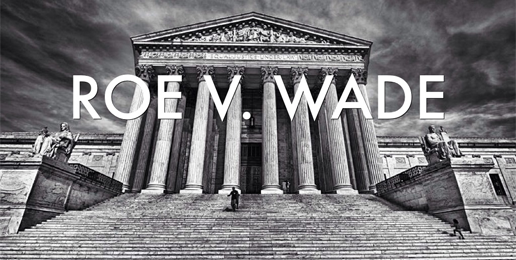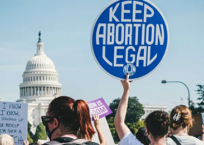
Written by Patience Griswold
Recently, we celebrated one year in a post-Roe America. As we acknowledge this important milestone, it’s worthwhile to look at how a decision handed down by a U.S. Supreme Court Justice still shapes the way our nation thinks about the humanity and rights of the pre-born after five decades — especially since a closer examination of the standard the Court offered reveals it to be capricious and arbitrary at best.
In the Roe v. Wade decision, Justice Harry Blackmun’s opinion presented “viability” as the cut off for when an abortion ought to be legally and morally accepted. He also presented a trimester framework for thinking about abortion and its limits. In the first trimester, “the abortion decision and its effectuation must be left to the medical judgment of the pregnant woman’s attending physician,” Justice Blackmun wrote. The state could offer restrictions in the second trimester that were “reasonably related to maternal health.” For Justice Blackmun, the beginning of the third trimester—28 weeks—was the point of “viability.” At this point, the state’s interest in “the potentiality of human life” allowed for abortion to be banned, as long as it allowed for exceptions for the life and health of the mother .
This framework was offered not by medical experts or in consultation with them, but by the judges of the Roe majority.
In the time since Roe, medical advancement has improved survival rates for babies born prematurely, and has brought the generally accepted age of “viability” to 24 weeks. However, this does not mean that a baby born before 24 weeks cannot survive, and there is a lack of consensus on when “viability” really is. One children’s hospital says on their website that with the right technology they can help a baby survive at 22 weeks. Preemies born as early as 16 weeks have survived.
“Viability” has always been a vague standard that opens a host of unanswered questions and moral and ethical problems. If abortion is acceptable until a baby can survive outside the womb, this would imply that the baby gains rights and “personhood” at that point. But a premature baby girl has a better chance of survival than a premature baby boy — does this mean that girls achieve personhood at an earlier age than boys? A baby born prematurely near a world-class NICU has a much better chance of survival than a baby born prematurely in an impoverished rural community with lack of access to quality medical care. Does this mean that babies born to poor or minority parents are less valuable than wealthy, white children? In short, does the point at which someone gains personhood depend on geography or the socioeconomic status of their parents?
If “viability” depends on factors such as where the baby is born and what kind of medical care is available, then human rights are based on completely arbitrary factors. Personhood becomes reduced to haves and have-nots. The right to life becomes a privilege endowed or revoked by the courts. In 1973, this arbitrary framework became the pillar of how the United States thought about, not just the legality, but the morality of abortion for the next 50 years.
Justice Alito asked an important question in the oral arguments for Dobbs that is all the more pressing in a post-Roe America. “The fetus has an interest in having a life. And that doesn’t change, does it?” he asked. “From the point before viability to the point after viability?”
A preborn child’s interest – and right – to life does not change based on an arbitrary line that was invented by nine men in black robes.
If personhood and the right to life that comes with it is something that we gain or lose over time, that we have more or less of based on our location and life circumstances, then it is meaningless and groundless. If, on the other hand, each person has value, personhood, and rights that are not based on their abilities, their location, their size, or their dependence on others, but simply on the fact of their inalienable humanity, then those rights begin at the very first moment of our existence. That value and those rights cannot be taken away or given by a fellow creature because they are innate to who and what we are. They are ours because of whose we are – because God creates each new life and gives all lives value and meaning.
One year ago, the U.S. Supreme Court overturned Roe v. Wade, calling it what it was — a travesty of justice. 14 states are now abortion-free and my prayer is that a year from now, 14 more will be added to that number. In a post-Roe America, we have the opportunity to build our laws and shape our nation’s moral understanding with a far better standard than the one dictated by Justice Blackmun. We have the opportunity to shape our laws around a recognition that every single person, from their very first moments, has value and rights that ought to be respected and protected. May that standard become the law of the land in all 50 states.
This article was originally published by Minnesota Family Council.






















